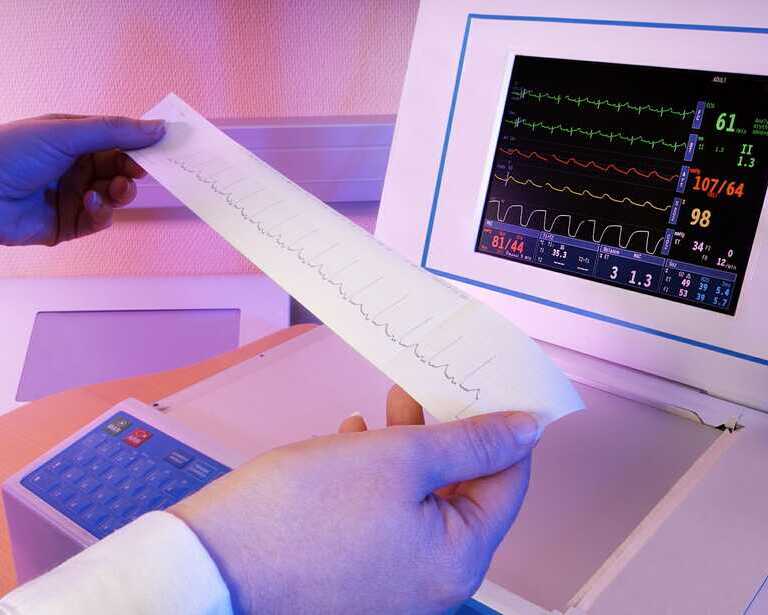– Nuanced healthcare roles can sound the same at first, but the training and specialization make them quite different from each other. –
If you’re thinking about a career as an EKG technician, you’ll probably come across other allied health terms during your research. One other specialty that can cause a bit of overlap and confusion is telemetry.
Technicians in both EKG and telemetry roles administer tests, operate equipment, and interact with patients on a daily basis. But there are quite a few differences between the two professions. In this article, we’re taking a closer look at what makes the two career paths different from one another so you can choose the best one for you.
What Does a Telemetry Technician Do?
The term telemetry refers to the act of taking measurements or monitoring outcomes and then using the data collected to made a diagnosis or decision. In healthcare, telemetry equipment and staff usually monitor patients with cardiac or neurological issues.
Using various monitoring devices, a telemetry technician will measure and record readouts, often in real time, and report findings to a doctor who can then prescribe treatments accordingly. This often requires continuous monitoring to keep an eye on all patient vital signs. Telemetry can also help healthcare providers see the impact of certain medications over a set period of time, allowing them to fine-tune dosages or change approaches.
Telemetry technicians are trained to set up monitoring equipment and also read or interpret the test results. They can spot issues or variations in heart beats or electrical impulses that can lead to severe cardiac issues or seizures. They send their reports on to doctors and specialists to determine next treatment steps, which are often quickly adjusted to improve patient outcomes. While telemetry technicians do not diagnose conditions, they are expected to determine data indicators and call upon physicians to take action.
Telemetry technicians usually work in hospitals in critical care units for either cardiac/coronary, neurology, or trauma patients. Because of this, they can be trained on how to administer an EKG as well as stress tests, EEG, and Holter monitoring. They also learn to monitor blood pressure, respirations, and oxygen saturation levels.
Is an EKG Technician the Same as a Telemetry Technician?
Not quite. While telemetry technicians are more generally trained across different testing and monitoring types, EKG technicians specialize in administering electrocardiographs. EKG technicians can work in hospital coronary care units, but they can also find work in private practices, long-term care facilities, and outpatient diagnostic testing centers.
EKG technicians are able to determine whether the read outs from the EKG are accurate, but they do not interpret the results or provide any direction. All test results are reported back to a physician for review without comment. EKG technicians and the tests they perform also evaluate more than just heart rhythms. They are able to hone in on potential areas of damage, blockages, and blood flow problems.
While telemetry technicians often monitor the same patients for long periods of time in critical care settings, EKG technicians conduct diagnostic testing without long-term monitoring. A telemetry technician may be assigned to just a handful of patients for an entire shift. But an EKG technician could see dozens of patients in a day as they come in and out of a testing center or clinical office.
The Path to Becoming a Telemetry or EKG Technician
The training programs for both careers are also different. There are specific programs for telemetry technicians and EKG technicians, so it is important to choose the right course for your career goals.
To become an EKG technician, you must first participate in a training program and receive a certificate of completion. This includes book learning, classroom sessions, and clinical hands-on experience. EKG technicians also benefit from achieving national certification, which most employers look for as a sign of content mastery.
While there are no required certifications for telemetry, these technicians usually go on to specialize further to stand out from their peers in areas like cardiac sonography or vascular ultrasound. The initial telemetry training program can take anywhere from a few months to a year depending on the specific program you choose. Many community colleges and vocational schools offer courses for this requirement. It is also a popular choice for practicing nurses and other allied health professionals looking to grow their skills.
Become a Nationally Certified EKG Technician with NPS
Register with NPS for your CET national certification today. NPS offers national Certified EKG Technician (CET) Certification for individuals who have completed a training program and are ready to stand out to employers with independent confirmation of their skills.




